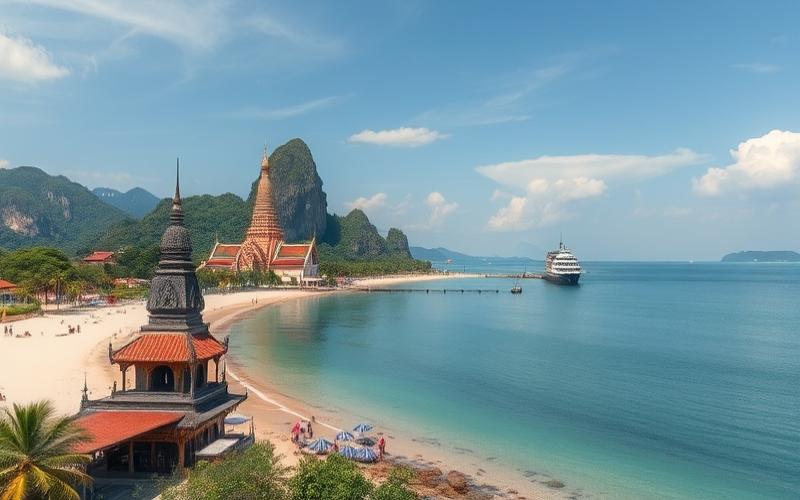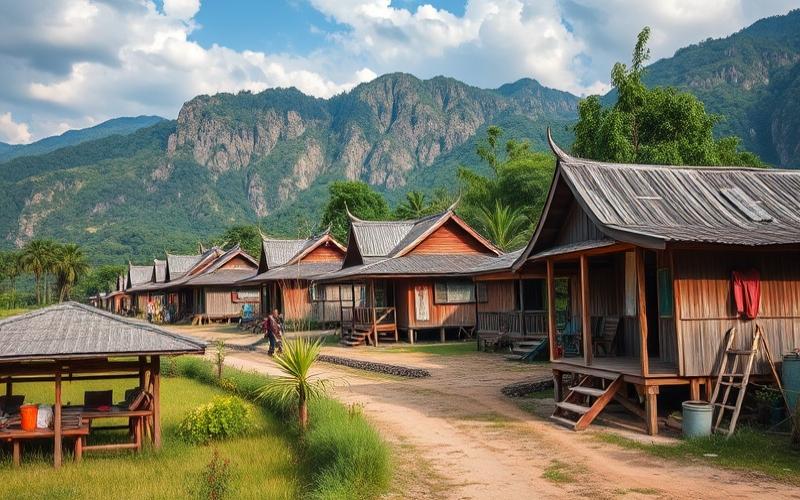
 Published on and written by Cyril Jarnias
Published on and written by Cyril Jarnias
The Impact of the War in Ukraine on Thai Real Estate
Russia’s invasion of Ukraine has upended the global geopolitical landscape, unexpectedly affecting economic sectors, including the Thai real estate market.
While this country, prized for its enchanting landscapes and mild climate, continues to attract international investors, the economic and political repercussions of the ongoing conflict are being felt as far as the Land of Smiles.
The Economic Effects of the Conflict
From currency fluctuations to global energy market instability, this war has redefined opportunities and challenges for Thai real estate players.
It also influences the purchasing decisions of expatriates and local investors, creating a new context for the real estate market.
Good to Know:
Thailand remains an attractive destination despite geopolitical turbulence, thanks to its relative political stability and pleasant living environment.
Geopolitical Consequences of the War in Ukraine on the Thai Real Estate Market
The war in Ukraine has had an indirect but significant impact on the real estate market in Thailand through several global economic channels, creating both challenges and opportunities for investors.
Global Economic Factors:
- Currency Fluctuations
- Geopolitical uncertainty has contributed to increased volatility of the Thai baht against major international currencies, affecting the investment cost for foreign buyers.
- This volatility makes yield projections more uncertain and pushes some international investors to postpone their purchases or favor other markets perceived as more stable.
- Changes in Foreign Investments
- A reorientation of global real estate investment flows is notable: while some markets benefit from the arrival of new investor profiles (like Indonesia with diversification towards Russians or Ukrainians), Thailand is experiencing more of a wait-and-see attitude.
- International purchasing power is hampered by overall economic instability, leading to a marked slowdown in real estate transactions in the country. Foreign buyers hesitate at the prospect of heavy financial commitments in an unpredictable context.
- Increase in Construction Material Costs
- The global rise in raw material prices—a direct consequence of the Ukrainian conflict on energy supply and logistics—weighs heavily on construction costs in Thailand.
- This leads to a significant reduction in new real estate projects launched by local developers, who are now mainly trying to offload their existing stock to preserve their margins.
| Factor | Observed Impact (2022–2025) |
|---|---|
| Currencies | Unstable Baht; delayed purchases |
| Investments | Less dynamic; caution |
| Materials | Costs +20% in some sectors |
Impact on Tourism:
- The temporary closure or major modification of some air routes between Europe/Russia and Asia has caused a notable decrease in the number of Russian or Ukrainian tourists, traditionally very present in certain beach areas like Phuket.
- General instability also deters European tourist investors who were previously keen to acquire second homes or seasonal rental properties.
- This decline affects not only seasonal rental demand but also direct acquisitions by these foreign clienteles.
Recent Evolution of the Thai Real Estate Market:
Since early 2022:
- Overall sales have declined sharply (up to –40% for some major developers in the first half of 2025).
- Listed prices sometimes see drops of up to –30/-35% in distress sales.
Numerical example:
| Year | Average Price Variation per m² Bangkok/Phuket |
|---|---|
| End of 2021 | stable |
| End of 2022 | –5 % |
| End of 2023 | –10 % |
| Mid–2025 | –15 % or locally up to –30 % |
Opportunities for Investors:
- For those with significant liquid assets:
- Easier access to a large stock sold at a discount
- Ability to negotiate firmly with motivated sellers
- Market conducive to “value” operations: purchase/resale after future stabilization
Major Challenges:
- Increased difficulty in accessing local bank credit
- Persistent uncertainty about a quick return to better international tourism conditions
- Additional risk related to domestic and external political uncertainties
The current geopolitical context therefore requires extreme caution but also occasionally opens the door to some exceptional opportunities reserved for savvy investors capable of acting quickly.
Good to Know:
The war in Ukraine has had indirect repercussions on the Thai real estate market, notably through currency fluctuations and changes in foreign investments. Global instability has pushed some investors to seek safe havens, making Thailand an attractive option thanks to its relatively low interest rates. However, increases in construction material prices, due to supply chain disruptions and economic sanctions, have led to rising costs in the real estate sector. In 2023, currency volatility made investments more uncertain, influencing the ability of foreign buyers to acquire properties in Thailand. Furthermore, the rerouting of flights and the decline in Russian tourism, once a significant clientele, have complicated the tourist real estate scene. Property prices in key tourist areas have seen variations, some dropping slightly but others benefiting from new inflation due to increased domestic demand. For investors, this situation creates advantageous buying opportunities in some regions, while posing challenges related to the sustainability of returns on investment in others.
Impact of the Influx of Ukrainian Refugees on Housing in Thailand
Statistics on Ukrainian Refugees in Thailand and Impact on the Real Estate Market
Available data indicate that in 2023, Thailand had approximately 87,314 refugees of all nationalities combined, a decrease compared to 2022. However, the majority of these refugees historically come from neighboring countries (Myanmar, Cambodia), with Ukrainians representing a marginal share of the total.
Global statistics record over 6.8 million Ukrainian refugees worldwide in early 2025, but the vast majority are in Europe and Russia. Thailand does not appear among the main host countries for this specific flow.
Consequently, the influx of Ukrainian refugees into Thailand remains limited and has not generated a measurable or significant effect on real estate supply and demand at the national level.
Areas with Significant Impact and Rent Evolution
Major urban centers (Bangkok, Pattaya, Phuket) traditionally host the majority of European expatriates, including Ukrainians present for reasons other than seeking asylum.
No sources report a notable increase in rents or a scarcity of housing specifically linked to the reception of Ukrainian refugees.
Recent fluctuations in rents or housing availability in these areas are more related to international tourism or local demand, not to an impact from refugee flows.
Housing Policy and Government Initiatives
Thailand does not have a specific large-scale reception or housing policy for Ukrainian refugees.
The Thai approach remains restrictive: the majority of refugees live in camps along the border with Myanmar, under international supervision.
For refugees outside these camps, including Ukrainians, access to housing relies on private or informal solutions. No major national initiative for sustainable housing for this population has been identified recently.
Long-Term Effects on the Real Estate Sector
| Factor | Observed/Anticipated Effect on the Real Estate Sector |
| Refugee Influx | Marginal, no significant impact identified |
| Housing Availability | Unchanged for now |
| Rents | No increase attributable to refugees |
| Public Policies | No specific structural measures |
Long-term effects depend heavily on the geopolitical evolution and a potential change in migration flow. At this stage, Thailand is neither a preferred destination nor a country of mass settlement for Ukrainians fleeing the war.
If the situation were to evolve (opening of new migration routes, more favorable policies), an impact could emerge, but it would remain limited compared to other Asian or European real estate markets.
Visual Summary of Recent Trends
| Year | Total Number of Refugees in Thailand | Annual Variation (%) |
| 2021 | 100,510 | +4.5 |
| 2022 | 94,472 | -6.0 |
| 2023 | 87,314 | -7.6 |
The figures above encompass all origins and confirm a downward trend in the total number of refugees in Thailand, with no peak linked to the Ukrainian crisis.
Key Takeaways
- Ukrainian influx very limited in Thailand
- No significant impact on real estate observed
- Unchanged housing policies
- Long-term effects uncertain and likely marginal in the current state
Good to Know:
Since the start of the war in Ukraine, Thailand has welcomed approximately 5,000 Ukrainian refugees, which has exerted some pressure on the local real estate market, albeit to a lesser extent compared to Europe. Major cities like Bangkok and Pattaya, where the expatriate community is significant, have experienced the most notable changes, including minor rent adjustments and fluctuating short-term housing availability. The Thai government has implemented specific policies for refugee housing, including partnerships with local agencies to convert temporary shelters into medium-term housing. In the long term, challenges could lie in geopolitical uncertainty and the evolution of refugee flows, requiring careful monitoring to prevent saturation or underutilization of existing infrastructure.
Thai Real Estate Investment Strategies Amid Geopolitical Tensions
Global geopolitical tensions, notably the war in Ukraine, are affecting the real estate market in Thailand primarily through economic uncertainty, international capital movements, and evolving monetary and government policies.
Direct Impacts on the Thai Real Estate Market:
- Decline in Sales and Profits: Major Thai real estate developers have recorded sharply declining results since early 2025, with a 30 to 40% drop in profits and a notable decline in sales, especially for condominiums.
- Plummeting Property Transfers: Property transfers fell by 32% in the first quarter of 2025, indicating strong caution from investors and buyers.
- Rising Costs and Reduced Margins: Imported inflation and market volatility, linked to geopolitical tensions, weigh on construction costs and reduce developers’ margins.
Investment Strategies in the Face of Uncertainty:
- Portfolio Diversification:
- Institutional and private investors diversify geographically (Bangkok, Phuket, Pattaya, Koh Samui) and sectorally (residential, commercial, seasonal rental).
- Some turn to secondary cities or segments less exposed to international volatility.
- Targeting Specific Properties:
- Strong demand for condominium apartments, more accessible to foreigners and less sensitive to land restrictions.
- Seasonal rental real estate (Airbnb, short-term rental) continues to attract, especially in tourist areas, even if revenues are more cyclical.
- Assessment and Management of Geopolitical Risk:
- Analysis of macroeconomic scenarios (baht volatility, impact on tourism, banking restrictions).
- Use of hedging instruments against exchange rate variations for international investors.
- Seeking Opportunities During Market Downturns:
- Some investors take advantage of periods of low demand (low tourist season or cyclical downturn) to negotiate attractive prices.
Concrete Examples of Successful Strategies:
| Strategy | Application Example | Result Achieved |
|---|---|---|
| Geographic Diversification | Acquisition of properties in Chiang Mai and Phuket | Reduction of localized risk |
| Targeting Tourist Rental Segment | Investment in short-term rentals in Pattaya | Stable rental yields |
| Seasonal Arbitrage | Purchase in low season, resale in high season | Short/mid-term capital gain |
| Exchange Rate Risk Hedging | Use of financial derivative products | Protection against volatility |
Influence of International Capital Movements and Interest Rates:
- Influx of Foreign Capital: Despite uncertainties, Thailand remains attractive for international investors seeking to diversify outside Europe and Ukraine.
- Interest Rates: Changes in global benchmark rates, linked to the war and inflation, influence the cost of real estate credit and investment profitability.
- Increased Regulation: Government measures aim to facilitate access to credit (LTV relaxation), but caution remains necessary in the face of persistent volatility.
Response of Thai Government Policy:
- Relaxation of Real Estate Credit: Temporary measures to stimulate demand and support the market (more flexible LTV until June 2026).
- Support for Foreign Investment: Regulatory evolutions towards more flexibility for foreigners in certain segments, while maintaining restrictions on land ownership.
Summary of Key Levers for Investors:
- Carefully study the geopolitical and monetary situation.
- Diversify assets and locations.
- Prioritize resilient segments (rental, condominiums).
- Use financial risk management tools.
- Take advantage of market cycles to negotiate downward during downturn phases.
Caution and agility remain the watchwords for successful investment in the Thai real estate market in a context of global uncertainty.
Good to Know:
Geopolitical tensions, like the war in Ukraine, push real estate investors in Thailand to adopt diversified strategies to protect themselves against uncertainty. Many turn to portfolio diversification, integrating residences and commercial properties in less volatile tourist areas, while others meticulously assess geopolitical impacts to protect returns. For example, with the internationalization of capital accentuated by monetary movements, some bet on luxury, targeting Western expatriates and retirees. Fluctuations in global interest rates force investors to be vigilant about changes in Thai monetary policy, which could impact profitability. Developing such strategies often involves close collaboration with local advisors who are well-informed about government policies regarding taxation and incentives for foreign investments.
Disclaimer: The information provided on this website is for informational purposes only and does not constitute financial, legal, or professional advice. We encourage you to consult qualified experts before making any investment, real estate, or expatriation decisions. Although we strive to maintain up-to-date and accurate information, we do not guarantee the completeness, accuracy, or timeliness of the proposed content. As investment and expatriation involve risks, we disclaim any liability for potential losses or damages arising from the use of this site. Your use of this site confirms your acceptance of these terms and your understanding of the associated risks.



















































